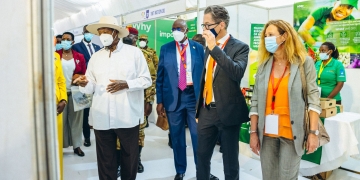
KAMPALA — The defense concluded its cross-examination Tuesday of the prosecution’s twelfth witness, a forensic chemist, in the trial of Molly Katanga. The witness’s extensive academic background was a point of emphasis during the proceedings.
Following the defense’s questioning by attorney Elison Karuhanga, the prosecution requested a recess to allow the expert to consult relevant literature in preparation for re-examination.
Testimony from Dr. Jaffer Kisitu, affiliated with Uganda Police, revealed several admissions under rigorous questioning:
He acknowledged the absence of a formally documented and approved protocol for conducting the experiments relevant to the case. Instead, Kisitu stated he utilized a student research paper concerning soil samples from the Amuru district as a procedural guide for gunshot residue analysis.
While gunshot residue (GSR) was reportedly detected on clothing belonging to Molly Katanga, the same garment yielded no DNA evidence attributable to her.
Kisitu confirmed the absence of any GSR on Molly Katanga’s hands.
He conceded that the methodology employed to test for organic components of GSR lacks endorsement from major international forensic bodies. Karuhanga suggested that Kisitu’s presentation of such evidence marked a novel instance within the region’s legal context.
The gunpowder collected from the muzzle of the alleged firearm did not exhibit an exact match with substances found on any of the items subjected to testing, a discrepancy that prompted Karuhanga to state, “I have no further questions my Lord.”Dr. Kisitu’s initial testimony, led by Chief State Prosecutor Jonathan Muwaganya, identified him as a 37-year-old Superintendent of Police and the Deputy Head of the Department of CDRNe-A (chemical biological, radiological, nuclear, explosive residue analysis). He also testified to his role as the lead examiner in the chemistry department within CDRNe-A.
In response to inquiries about his qualifications, Kisitu listed a Doctor of Philosophy in natural sciences from the University of Konstanz in Germany (awarded in 2020), a Master of Science in forensic science obtained through the Erasmus Mundus program involving the University of Lincoln (UK), the University of Cordoba (Spain), and the Higher Institute of Health Sciences (Portugal) in 2015, and a Bachelor of Science degree in Biochemistry and Chemistry (conferred in 2010). He further cited numerous certifications in areas such as LC-MS/MS (Liquid Chromatography) and ClGC-MS/MS (Gas chromatography)-tandem mass spectrometry.
A point of contention arose during the proceedings concerning the defense’s request for the disclosure of the work instructions utilized by the forensic chemist.
Karuhanga asserted, “let’s see the work instructions you used. This is trial by ambush!”
State Attorney Wakooli countered, “Mr Karuhanga, I want you to know that you’re not the only one with a monopoly over bad manners. We have to be very sensitive in the way government handles information especially when it relates to security issues. This is not the only case the lab is handling. We have cases of terrorism. Cases of national security. It is not viable that we disclose… My Lord, such documents can’t be what I require to prove this case. I require a report. This constant demand for information is what we find very disturbing to the extent that now they want to go and be part of the lab but labs do processes that are scientific, you can’t transfer them to a courtroom. As far as I’m concerned, I’m supposed to disclose materials and I’ve disclosed a report.”
The presiding Judge ruled against the prosecution’s position, stating, “you can’t exclude that information about procedures & steps.”
Wakooli argued, “the challenge we’ve been having at the beginning of this trial is for the defense team to think we should do the research on their behalf.”
The defense responded audibly in disagreement.











Discussion about this post